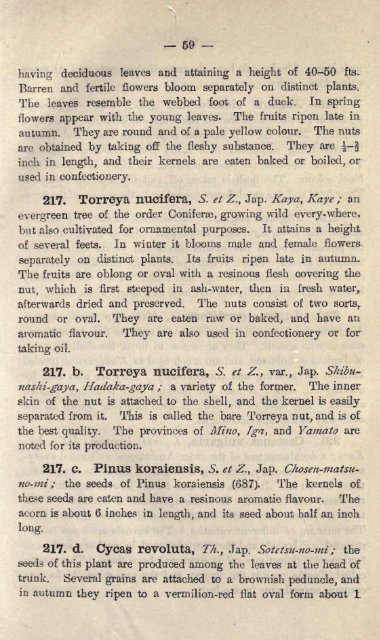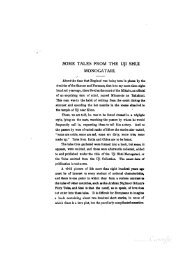Untitled - University of Oregon
Untitled - University of Oregon
Untitled - University of Oregon
Create successful ePaper yourself
Turn your PDF publications into a flip-book with our unique Google optimized e-Paper software.
59<br />
having deciduous leaves and attaining a height<br />
<strong>of</strong> 40-50 fts.<br />
Barren and fertile flowers bloom separately on distinct plants.<br />
The leaves resemble the webbed foot <strong>of</strong> a duck. In spring<br />
flowers appear with the young leaves. The fruits ripen late in<br />
autumn. They are round and <strong>of</strong> a pale yellow colour. The nuts<br />
are obtained by taking <strong>of</strong>f the fleshy substance. They are ^inch<br />
in length, and their kernels are eaten baked or boiled, or<br />
used in confectionery.<br />
217. Torreya nucifera, S. et Z., Jap. Kaya, Kaye ; an<br />
evergreen tree <strong>of</strong> the order Conifers, growing wild every-where,<br />
but also cultivated for ornamental purposes. It attains a height<br />
<strong>of</strong> several feets. In winter it blooms male and female flowers<br />
separately on distinct plants.<br />
Its fruits ripen late in autumn.<br />
The fruits are oblong or oval with a resinous flesh covering the<br />
nut, which is first steeped in ash-water, then in fresh water,<br />
afterwards dried and preserved. The nuts consist <strong>of</strong> two sorts,<br />
round or oval. They are eaten raw or baked, and have an<br />
aromatic flavour. They are also used in confectionery<br />
taking oil.<br />
or for<br />
217. b. Torreya nucifera, S. et Z., var., Jap. Shibu-<br />
nasJii-gaya, Hadaka-gaya ; a variety <strong>of</strong> the former. The inner<br />
skin <strong>of</strong> the nut is attached to the shell, and the kernel is easily<br />
and is <strong>of</strong><br />
separated from it. This is called the bare Torreya nut,<br />
the best quality. The provinces <strong>of</strong> Mino, Iga,<br />
noted for its production.<br />
and Yamato are<br />
217. c. Pinus koraiensis, S. et Z., Jap. Cliosen-matsuno-mi<br />
; the seeds <strong>of</strong> Pinus koraiensis (687). The kernels o<br />
these seeds are eaten and have a resinous aromatic flavour. The<br />
acorn is about 6 inches in length, and its seed about half an inch<br />
long.<br />
217. d. Cycas revoluta, 77*., Jap. Sotetsu-no-mi ; the<br />
seeds <strong>of</strong> this plant are produced among the leaves at the head <strong>of</strong><br />
trunk. Several grains are attached to a brownish peduncle, and<br />
in autumn they ripen to a vermilion-red flat oval form about 1

















